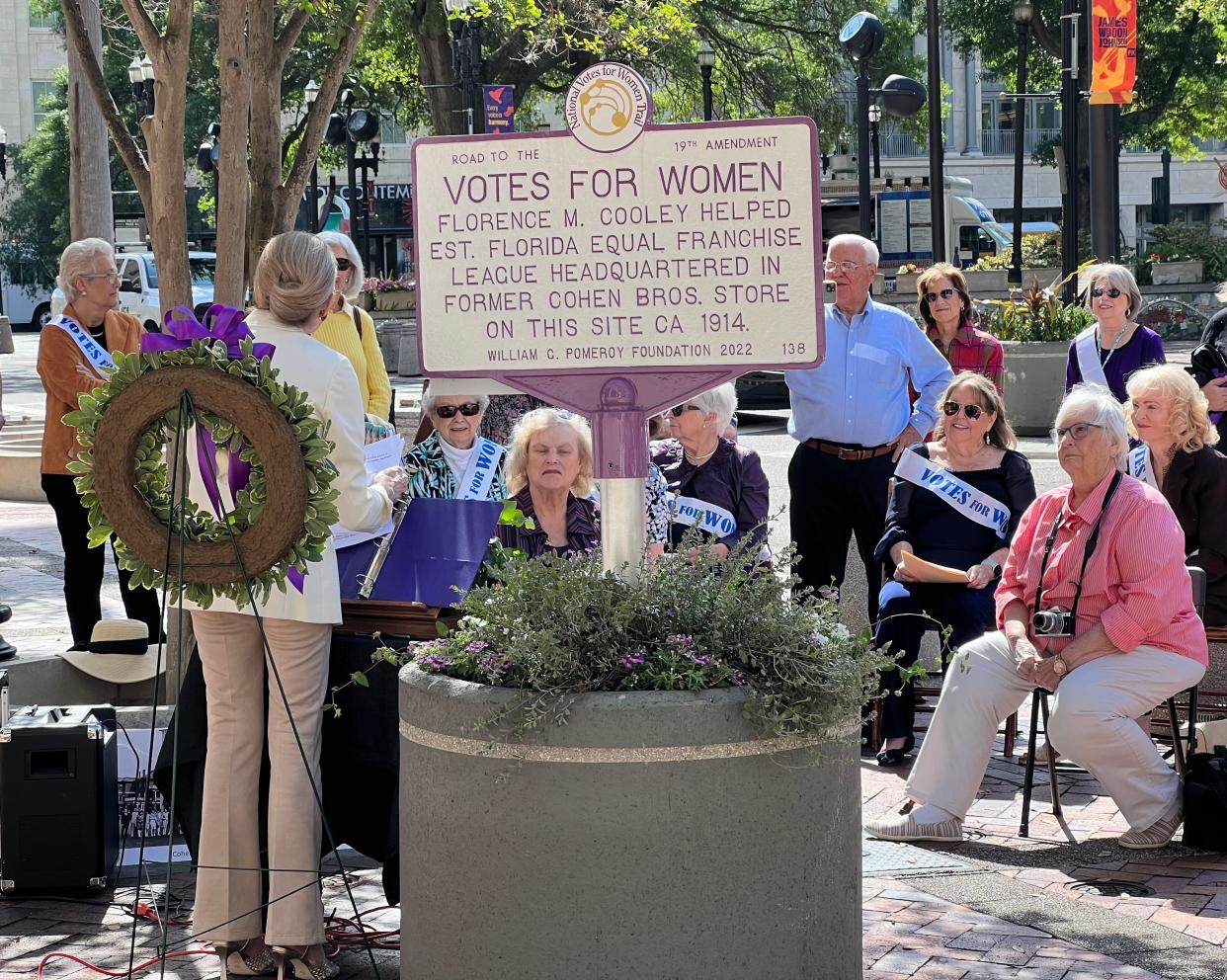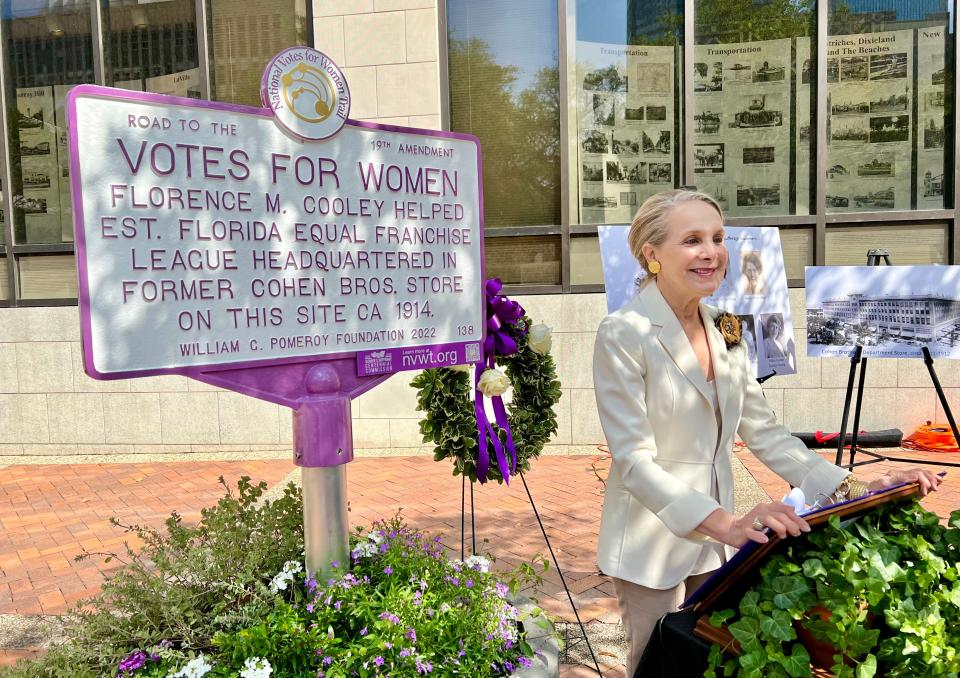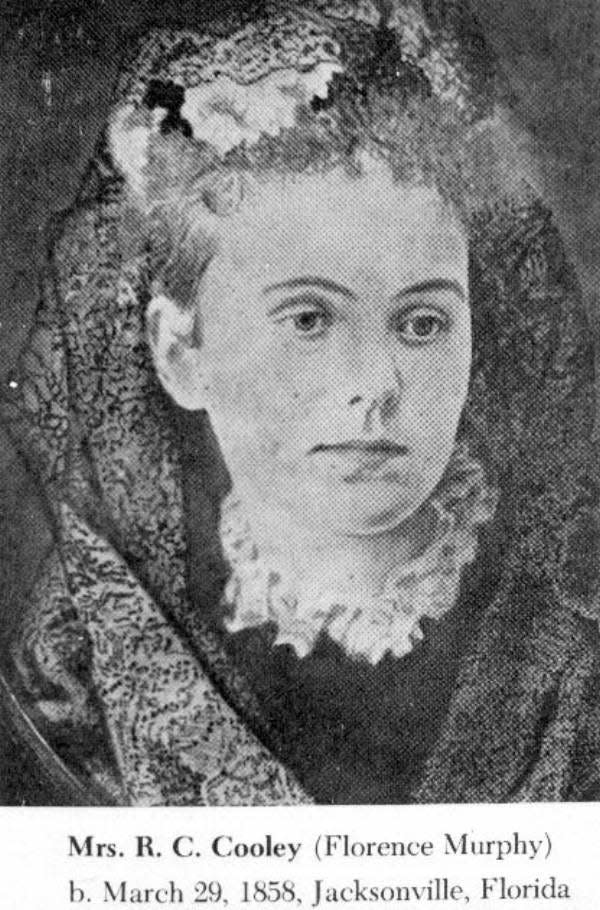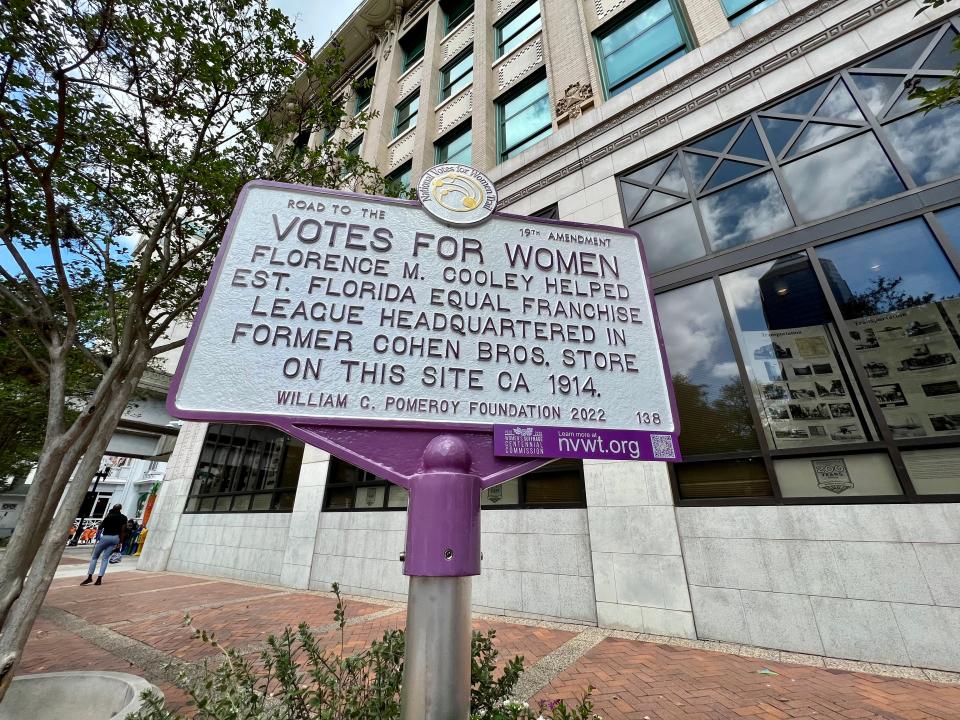Mark Woods: 'Road to 19th Amendment' did more than pass through Jacksonville

A group of about two dozen women (and a few men) gathered Wednesday morning in front of City Hall for the unveiling of a marker.
They donned white sashes with blue lettering that said, “VOTES FOR WOMEN.”
A passerby might’ve glanced at this and thought it was about voting for women, maybe a reaction to the dichotomy of what the recent election could mean for the number of women serving in the nearby building.
On one hand, Donna Deegan won more votes than any other mayoral candidate to become the first woman to head to a runoff for Jacksonville mayor. On the other hand, the election meant that the future City Council will have a maximum of three women in the 19 seats.
But this gathering wasn’t about 2023. And it was explicitly nonpartisan. The sashes, along with the unveiling of the marker, were an homage to what happened more than 100 years ago in the building that now is City Hall — how a group of Jacksonville women met there to fight for the right to vote.
Honoring Florence Murphy Cooley
“We're thrilled to be here today so that we can honor some of the women that have come before us,” said Emily Lisska, the former executive director of the Jacksonville Historical Society and a member of the event sponsor, the Women’s Club of Jacksonville.

They chose the date — March 29 — partly because it was in the waning days of Women’s History Month, and partly because it was Florence Murphy Cooley’s birthday.
She was born in 1858. When Cooley died 61 years later in 1924, it was front-page news around the state. She was remembered for leading the effort to build a Jean Ribault monument at Mayport — and for her role in a women’s suffrage movement that spanned much of her lifetime.

As Lisska explained at the unveiling of the marker that highlights Cooley, a key moment for Jacksonville came in 1902.
Five years after founding the Women’s Club of Jacksonville, Katherine Livingston Eagan traveled to Washington, D.C., for a gathering of suffrage groups from all over the country. While there, Eagan attended a reception for Susan B. Anthony’s 82nd birthday. And when Eagan met the honoree, Anthony bluntly told her that Florida was the only state in the union that hadn’t done anything for the cause of women’s suffrage.
Those words stuck with Eagan. And a decade later, in June of 1912, when a group of women met at a house on Market Street to discuss the closing of meat markets on Sundays, they realized they had another cause in common. They all were ardent suffragists.
Within a month, they formed the first women’s suffrage organization in Florida, calling it the Florida Equal Franchise League. Eagan was the first president. Florence Cooley was vice president. And when Eagan left Florida a year later, Cooley took over as FEFL president.
At the time — no surprise here — many men didn’t support their cause.
There’s a story about how, after the all-male Florida Legislature held a vote on the issue and ended up refusing to make a recommendation, Cooley and other women wrote a letter to state senators challenging them to an open debate. The women proposed that the senators pick one of their colleagues to debate Jeanette Rankin, a Montana suffragist who later became the first woman elected to the U.S. Congress.
"In order that the cause of equal suffrage may have a fair hearing before it is submitted to a vote of the senate, we respectfully challenge you to engage in a joint debate on the subject,” the letter said.
While that debate didn’t happen — the senators declined to “burden the legislative period with further discussions on this subject” — Cooley and a growing group of women in Jacksonville persisted.
Soon private homes could no longer hold the 100 or more women who wanted to attend the meetings. And so in 1914, Jacob Cohen, one of the men who supported the cause, offered the organization space in his building — Cohen Brothers department store.
That’s why, on a blustery March morning in 2023, they unveiled a new marker about 40 feet west of the main entrance to City Hall. The sign, with pink lettering and trim, is part of the National Votes for Women Trail (as it says atop the sign, the “Road To The 19th Amendment”).
The trail consists of two parts: a database with a digital map, and the historical markers, funded by the William G. Pomeroy Foundation, at about 250 sites around the country.
Lisska noted that there are more markers (14) in Florida — the same state that might have deserved Susan B. Anthony’s harsh words in 1902 — than in any other state. And in Jacksonville, another one is devoted to a woman who deserves to be remembered for, among many other things, her role in women’s suffrage: Eartha White.
When the 19th Amendment finally was ratified on Aug. 26, 1920, the culmination of a battle that lasted 70 years, local women wasted no time in taking the next step. On Sept. 7, a Jacksonville woman — Helen Hunt — became the first woman to register to vote in the state.
Five weeks later, the voter registration in Jacksonville included 8,702 white women and — thanks to the efforts of Eartha White — 7,309 Black women.
“The two biggest obstacles involved women who didn't want to declare a party affiliation, and women who refused to reveal their age,” Lisska told those gathered. “Both matters were handled with ease, especially when the solution regarding age allowed women to use '21-plus.'”
In 1921, a woman entered the race for a city commission seat.
Florence Cooley became the first woman to run for office in Jacksonville — and also the first woman to lose.
Today in Duval: more female than male voters
In the 1920s, even after that initial registration, the number of male voters far outweighed female voters. One hundred years later, that’s no longer the case.
Out of the 657,194 active registered voters in Duval County today, a total of 347,884 are women — 56,145 more than men.
We’ve reached the point in history where maybe we don’t think twice about this. But those who gathered last week for the unveiling hope we will think about it when we pass the sign.

All of them were 21-plus years old — most enough plus that when Lisska asked if any of them had memories of shopping at Cohen Brothers, the department store that closed in 1987, nearly all raised their hands.
Hattie Kaufman was there representing the local chapter League of Women Voters, which was established after the ratification of the 19th Amendment.
“What these women accomplished was really remarkable when you think about the social climate at that time,” she said. “One of the arguments against the vote was that they were just giving married men two votes. They stood up and said, ‘No, we have our own minds. We want to have our own voice. We want to vote.’”
So she’s disappointed when we have an election like the recent one where nearly three-fourths of registered voters — men and women — don’t vote.
“People worked so hard to get the right,” she said. “And for us not to use that right, it’s sad. It’s tragic.”
This was echoed by others, who said they don’t want anyone to take voting for granted, particularly women. Katherine Naugle, a lawyer and past president of the Women’s Club of Jacksonville, is a generation younger than many at the event, but she has seen changes in her lifetime — a point she makes with her 13-year-old daughter.
“I tell her, ‘You can do whatever you want,’” she said.
Billie Hayward talked about how Florence Cooley’s generation paved the way for her to be a part of the next women’s movement — and how the generation of her granddaughter and my daughter are building on that.
When she said this, I thought of something my wife did with our daughter, starting when Mia was an infant. Every time Toni went to the polls, she took Mia with her. And when Mia was 18, they went together.
I can’t imagine them not voting.
So with that in mind, I brought home something for them: a sash like the ones worn by suffragists, with the words “VOTES FOR WOMEN."
mwoods@jacksonville.com
(904) 359-4212
This article originally appeared on Florida Times-Union: New marker honors Florence Cooley and women's suffrage in Jacksonville

